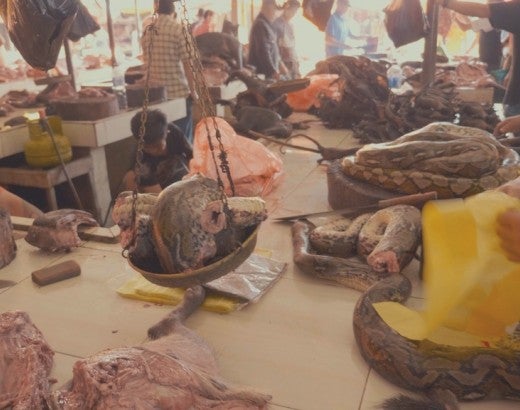China today announced a ban on buying and selling wild animals for food, taking its most decisive action yet to halt a trade that has been implicated in the global coronavirus crisis, and that causes immense suffering for hundreds of thousands of animals each year, including endangered wildlife.
China’s wildlife trade has decimated populations of certain wild animals within the country and in other nations, and this is its most monumental announcement concerning animal welfare since it banned ivory in 2017. Today’s decision has the potential to affect even more animals than the ivory ban, because of the sheer volume and number of animals involved in the wildlife trade. And it couldn’t have come sooner: the coronavirus outbreak, believed to have originated at a live animal market in the city of Wuhan, is spreading to other countries. It has already claimed more than 2,600 lives, most of them in China, and sickened more than 79,000 people worldwide.
Wildlife markets have, in the past, spawned or exacerbated other global health crises as well, including Severe Acute Respiratory Syndrome (SARS) and the deadly bird flu, and China’s move today will also have the effect of preventing more disease outbreaks in the future.
The ban is especially significant because for far too long, the wildlife trade in China has had an outsized influence over the nation’s regulating agencies and has operated with impunity or little oversight. Even after the previous disease outbreaks, the markets were only temporarily banned and then reopened. But with casualties escalating—President Xi Jinping acknowledged last week that this is the biggest public health crisis the country has encountered since its founding in 1949—the government has clearly realized that it cannot both keep this inhumane industry alive and keep its citizens safe.
Today’s announcement from the National People’s Congress, the Chinese national legislature, elevates the ban from an administrative action to the level of a national law. Specifically, the announcement, issued as an emergency measure, creates a comprehensive ban on the trade in terrestrial wild animals bought and sold for food, including those who are bred or reared in captivity.
Finally, the national legislature announcement said, the hunting, trade and transport for consumption of terrestrial wild animals who naturally grow and breed in the wild will also be completely banned.
We hope the ban will also cause a decline in the numbers of endangered and at-risk animals brought into China through the transnational smuggling network and that China will include the trade in wildlife for medicinal or decorative purposes in the ban too. In order to prevent businesses that breed wildlife for consumption and other trade from carrying on their activities underground, China should also act to help these businesses transition to alternative livelihoods.
Hopefully China will next revise its Wildlife Protection Law to make the ban permanent. Meanwhile, Humane Society International will continue to closely follow the implementation and enforcement of the ban, and we will work with local animal advocates on restricting other areas of wildlife consumption not covered by the announcement. But today, let’s applaud the Chinese government for taking this important step in the right direction, for its people, for the animals, and for the world.



